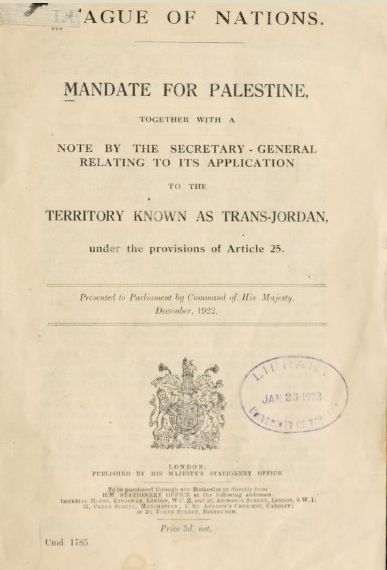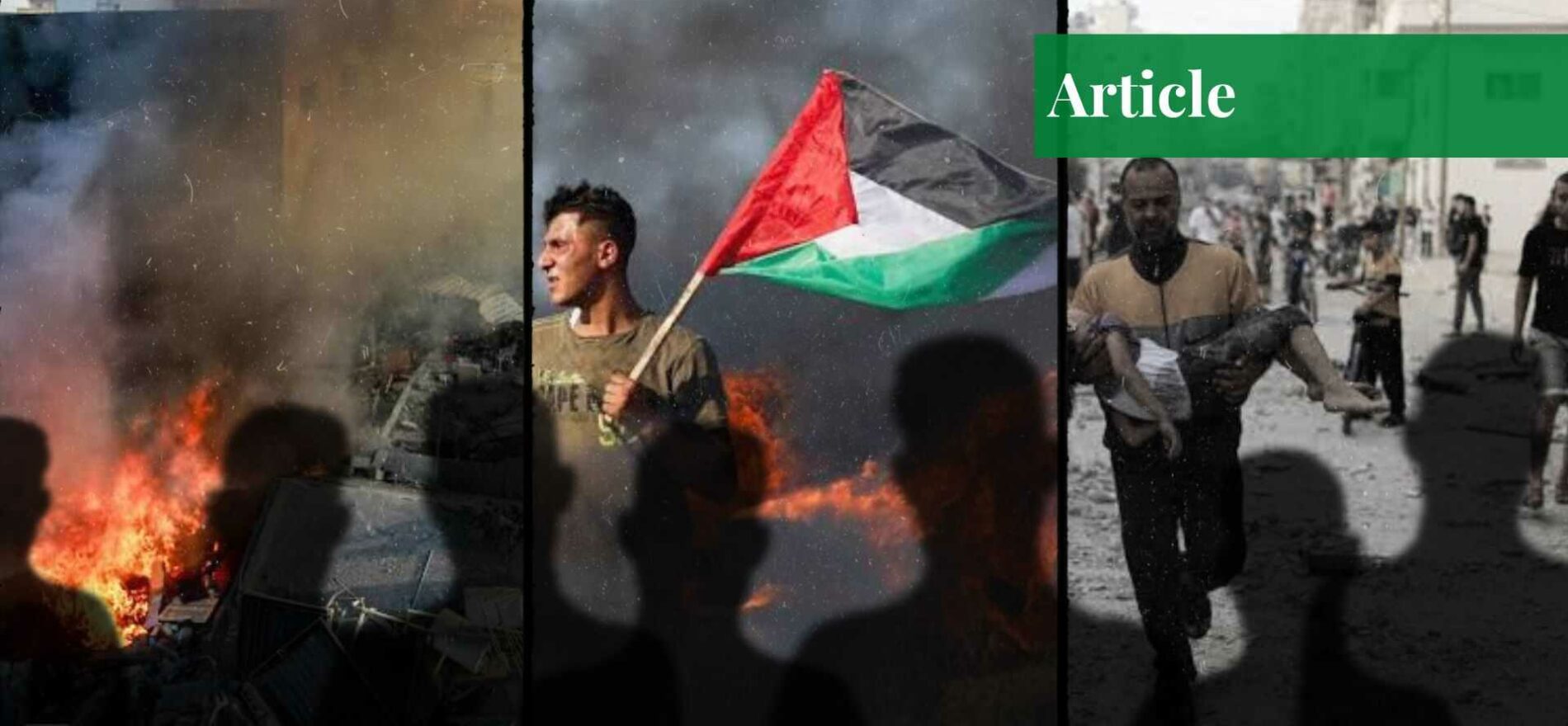Mr Hamza Sharif graduated with a degree in Mechanical Engineering from HITEC University. His areas of interest are geopolitics, current affairs, and history.
Attributing blame to one or multiple actors in the protracted conflict between Palestine and Israel requires a nuanced understanding of historical events and socio-political dynamics, but history goes way back; at least till the time of Prophet Musa. For this analysis, however, we shall take an excerpt from the times of the Umayyad Dynasty in Al Andalus (Cordova Capital).
Abd-al Rehman the Third became the Emir of Al Andalus in 912A D after his predecessor Abdullah ibn Muhammad. Muslims, Jews, and Christians lived in ‘convivencia,’ a term that means ‘co-existence’. None were persecuted on the basis of religion and belief; rather, non-Muslims were given the title ‘dhimmi’ or people who were granted special status and protection under the umbrella of Islamic law.
From the 8th to 13th century, the period has been termed the ‘Islamic Golden Age’ however, this was also the time when Jews, to some extent, were given carte blanche in the socio-economic spectrum. The zeitgeist was termed the ‘Golden Age of Jewish Culture’. To back this claim, I mention Hasdai Ibn Shaprut, a Jew and a personal physician of the Emir Abd-Al Rehman, who acted as a vizier without title. The linguistic advancement of Hebrew is attributed to his efforts.
Additionally, we have multiple other Jews who contributed not only to the state of Al Andalus but also to their own Jewish culture, for example, Samuel ibn Naghrillah, Menahem Bin Saruq, etcetera. Nevertheless, history tells us that the rise of an empire is contingent upon its fall. In 1492, King Ferdinand of Aragon and Queen Isabella of Castille took over Al Andalus, and Muslim rule had come to an end; so did the relative tolerance and prosperity of Jews in Al Andalus.
Rampant Jewish persecution co-linked with the Alhambra decree forced the Sephardic Jews to seek refuge someplace else. On the port of the Ottoman Empire waited the Viziers of Sultan Bayezid, the second to receive the first Sephardic Jewish refugee ship. Similar to Islamic Al-Andalus, the Jews established their center for Jewish thought and culture in the Ottoman Empire.
Let’s also delve into the lives of Jews under the rule of the rest of Christendom-dominant medieval Europe. Taking the examples such as the Crusades and the barbaric massacre of Rhineland Jews, Jews lived in forced seclusion in areas called ‘ghettos’. One such ghetto named Judengasse was situated in Frankfurt which was hardly a mile long and its width a mere 12 feet or so with a multitude of Jewish families cramped into it; the Rothschild family was one of them.

“Waddesdon Manor & Gardens” by Colin Park is licensed under CC BY-SA 2.0.
The maltreatment of Jews in Europe had multiple facets. There was the religious motive; the Christians showed resentment for the matter that Jews were to blame for the crucifixion of Jesus. Coming to economic aspects, usury was prohibited for Christians hence the business of lending money was often taken up by Jews; the rivalry resulted in discrimination and persecution of Jews. Medieval European politics would usually use Jews as a scapegoat for their own political failures.
Now whether the scapegoating was vindicated or not is not the scope of this article. However, we do see some iniquity when it comes to the fact that many Jews were blamed for causing the Black Plague in the 14th century. All these factors and many more reverberated into the anti-semitic demeanor of Christian Europe. This not only persisted in medieval Europe but also drifted off into 17th, 18th, and 19th century Europe.
In England, some Jews were forced into exile in Australia; Jews were shipped for merely being Jews. William Wentworth (17th-18th century), an Australian rights activist, had the support of former convicts, convicts, and Jews in Australia. To undermine his struggle for inclusive reforms in Australia, the elite would usually disparage his supporters by labelling them mere convicts and Jews. This is just one instance that describes the grotesque prejudice shown towards Jews in Europe.
Throughout European history, Jews have been disregarded. A more recent example is the infamous holocaust. Nevertheless, world Zionist organizations kept efforts going on for a separate homeland for Jews. These efforts ultimately cultivated into a series of agreements and correspondences between the British and the Zionists. Yet the commitments made to the Zionists were in total contradiction to what was committed to the Arabs in 1915 and 1916 in the MacMahon-Hussein Correspondence.
The British committed to Sharif Hussein, the King of Hejaz. that if the Arabs revolted against the Ottomans during World War I, they would support the independence of the Arabs. Simultaneously, the Triple Entente (UK, France, and Russia) in 1916 signed the agreement of Sykes-Picot. This was another instance when the British double-crossed the Arabs. This treaty envisaged that the territories of the Ottoman Empire shall be divided between the UK, France, and Russia.
The agreement was signed in clandestine circumstances attributing to the fact they were still fighting a war and needed the support of the Arabs. However, it was made public by the Bolsheviks when they took over Russia in the 1917 Russian Revolution which proved to be extremely humiliating for Britain; by then the damage had already been inflicted. By 1920, the British were granted the mandate for Palestine by the League of Nations which they formally adopted in 1922. Hence, began the larger part of the influx of Jews from Europe to Palestine.
As years passed by, tensions rose between the Arabs and the Jews. Jews resorted to guerrilla warfare with factions formed between 1920 and 1940 called the Haganah, Irgun and Lehi. The IDF formed after 1948 comprised of military personnel from all three factions mentioned above. These guerrilla fighters carried out sporadic attacks not only against the Arab civilians but also against the British forces present in Palestine.
From 1936 to 1939, major fighting broke out between the Arabs and the Zionists. We shall call them Zionists instead of Jews now as not all Jews are Zionists. Zionism is just another political thought affiliated to Jews with radical nationalistic ideas; much like the Hindutva concept in India. Nevertheless, in 1939, representatives from both sides met in the UK to concoct a plan to put an end to the exasperating situation in Palestine. Although the conference ended unsubstantially, the British issued the white paper to somehow alleviate the bellicose circumstances in Palestine.
The white paper stated that in the next five years, 75,000 more Jews would be given entry into Palestine (this would’ve made 1/3 of the population of the Jewish faith) and their purchase of land shall be highly restricted; after five years, it would be in the discretion of the Arabs to decide how many Jews can migrate further or how much land they can purchase. Both representatives rejected it on the basis that Palestine was to be solely Arab land and the Arabs were perhaps skeptical of the British inability to honor their statement owing to their previous betrayals.
Soon after the world was engulfed by World War II which pushed further Jewish diaspora into Palestine. At the end of the war, Britain had been battered by the belligerent repercussions of war. For Britain, the Palestine Mandate had become a white elephant, so it transferred the issue to the United Nations due to its milquetoast internal socio-economic and political factors. This is when the world decided on UN Resolution 181 to divide the land into three territories: a Jewish state, an Arab state, and Jerusalem as an international territory.

The Jewish state was to be granted Eastern Galilee, Jezreel Valley, the coastal area from Haifa to Tel Aviv, and the Negev desert. On the other hand, the Arab state was to be granted West Galilee, the West Bank, and the coastal area from Ashdod till the Egyptian border. The Jews comprised of lesser percentage of the population but were granted 56% of the land. Conspicuously, this was prejudice towards the indigenous people of the land.
This resolution was vehemently rejected by the Muslim nations and rightly so, keeping in view the unfair distribution. So who do we blame for this whole conundrum of keeping pre-1948 history into perspective? As we can see, multiple facets in history have resulted in the tipping point of this obstinate conflict. It would be absurd and ludicrous of me to say that the pragmatic methods of the Emirs during the Islamic Golden Age are to be blamed for welcoming Jews into Muslim lands and causing them to build a certain affection for Muslim lands.
The problem isn’t instilled in the Jews, but in the radical Zionists who govern authority in modern-day Israel. The extremist ideas of Zionism are condemnable and have blood on their hands. Its ideas such as the concept of ‘Greater Israel’ do not align with the current world order of respecting the sovereignty of every nation. Another actor we can definitely put the blame on is Britain and the non-altruistic demeanor with which it handled the mandate received from the League of Nations.
Britain being in a feeble position during the war required the pecuniary support of the rich Jewish families such as the Rothschilds who often lent money to the monarchy. Simultaneously, it also required the support of the Arabs to dismantle the Ottomans. An odor of foul play is definitely in the ambiance here. Britain failed to prognosticate the consequences its actions would result in. We observe a similar fate with the Kashmir dispute between Pakistan and India. From both conflicts, we see a pattern that Britain usually leaves the riddle unsolved for the people to solve without a proper framework for them to follow.
While I’ve labelled Britain and the concept of Zionism as the main reasons for this catastrophe, it would be highly unfair of me towards the people who suffer in Gaza and the West Bank to not fully address the third actor who is responsible for their suffering: the Arab countries and the internal organizations such as PLO, Fatah, and Hamas. From a historical point of view, my opinion is that the acceptance of the white paper was the best option available to Arabs.
Given that, after the 5-year transitional period, Arabs were to get discretionary powers over the minority Jew immigrants. Had the Arabs been prudent enough, through political maneuvering, they could’ve suppressed the effect of the immigrant Jews and, as seen throughout history, could’ve lived in convivencia again under majority Muslim rule.
However, keeping in view the current circumstances, many mistakes have been made, imperatively the division between the Arabs and the factions within existing Palestine itself. The Arab countries of the region fail to speak in unison and take up a staunch stance for Palestine. As for the internal politics of Palestine, factions such as PLO, Fatah, and Hamas are unable to come together due to their vested interests.
Amidst the current crisis, it is crucial for all Muslims to come together as one and vehemently condemn the actions of Israel and demand the international community to coerce Israel into a ceasefire and grant the Palestinians their human rights. It is not a matter of who’s on who’s side now, but rather who is humane enough to speak up against the barbarism carried out by Israel against the innocent Palestinians.
If you want to submit your articles, research papers, and book reviews, please check the Submissions page.
The views and opinions expressed in this article/paper are the author’s own and do not necessarily reflect the editorial position of Paradigm Shift.


















